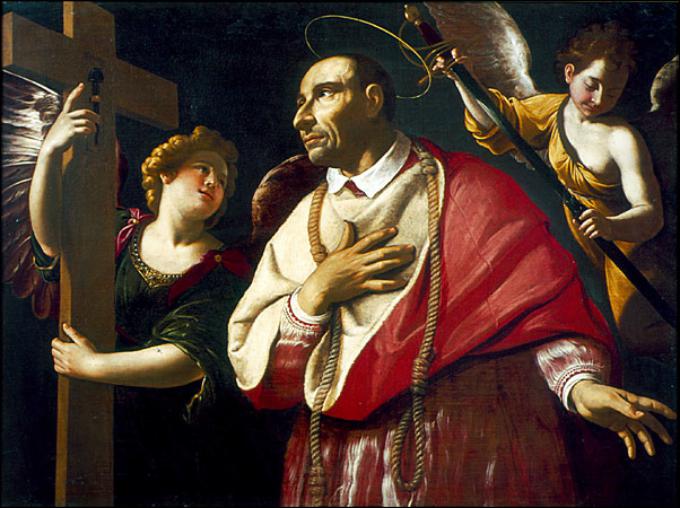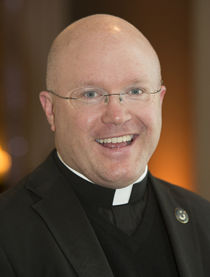
Faith
... we do well to look at the saints God filled with grace and raised up to bring the Church back to its true identity, holiness and mission during the period called the counter-reformation.

Landry
This year marks the 500th anniversary of the launch of the Protestant Reformation. As we draw closer to Oct. 31, the date on which Martin Luther posted 95 theses on the door of All Saints' Church in Wittenberg, it is important for Catholics to formulate the most fitting way to mark the occasion.
It's not a time for celebration. Children don't fête the day their parents separated. Christ insistently prayed on the vigil of crucifixion that his disciples would be one, just as he and the Father are one (Jn 17:11, 21) and it's impossible to imagine that Jesus rejoices at the 500 year-old rupture of his family in the West, just as we cannot picture him pleased at the schism between the eastern and western lungs of the Church in 1054 or delighted at any of the other breaches that have divided his Church over the centuries.
It's more properly, for Catholics and Protestants, a day of conversion and reparation. Martin Luther's original intention, as an Augustinian monk, was to summon the Church to repentance, and the fuel that fed the fire of the Reformation was aversion toward the widespread corruption in the Church. The Reformation was originally an attempt to rehabilitate the Church morally, before it metamorphosed to a doctrinal revolution with regard to the understanding of various sacraments, ecclesiology, the composition of the Bible, and the way people are saved.
Therefore, it's not contrary to a genuine spirit of ecumenism for Christians to ask for God's mercy for all the sins that led to this 500 year old fissure in the Church, for all the sins against unity that have been committed since, and in general for the joint scandal of division given to the world for half a millennium. Jesus said that Christian unity would help the world know that the Father sent him and that the Father loves us like he loves him (Jn 17:23). Christian disunity, therefore, obscures knowledge of Christ and divine love, revealed when two or more are gathered in Christ's name (Mt 18:20). It harms Christian witness and evangelization. It arms atheists and opponents of Christianity with data with which to try to attack the truth and goodness of Christianity. And so joint repentance leading to conversion is indeed fitting, and is a necessary precondition to shared docility to the means by which the Holy Spirit -- in ways that believers today cannot foresee -- will seek to restore unity in Christ's family.
Looking from a Catholic perspective at the conversion needed, we do well to look at the saints God filled with grace and raised up to bring the Church back to its true identity, holiness and mission during the period called the counter-reformation. There are many: Saints Ignatius of Loyola and the first Jesuits, Francis de Sales, Philip Neri, Pius V, Robert Bellarmine, Teresa of Avila, John Fisher, Thomas More and so many others who worked and prayed to repair the damage that fomented the Reformation. But I think the greatest reforming saint of all, the one who accomplished the most and set for us the most enduring paradigm for authentic ecclesial reform, is St. Charles Borromeo.
As Msgr. John Cihak illustrates in a great new book, "Charles Borromeo: Selected Orations, Homilies and Writings," St. Charles should have been part of the problem, because he arose from within the corrupt system. St. Charles' mother was a Medici, his father a Spanish Count, his uncle would be elected Pope Pius IV in 1559 and make him a cardinal the next month, even though he was only 21 and had only received minor orders. The following week he made him basically the equivalent of today's Secretary of State. Rather than appointing a functional archbishop for the huge Archdiocese of Milan, his uncle named him administrator, so that he could profit from its wealth and keep it "in the family." He was also named administrator of the Papal States and given several other benefices. It was a notorious case of nepotism, but God would avail himself of the opportunity, and use young Charles' faith, talents to lead the reform of the Church from within.
His uncle entrusted to him the plans to bring the Council of Trent, summoned to respond to the Reformation, to conclusion. He did and almost singlehandedly got legal canons approved in such a way as they could restore discipline to those who were supposed to be disciples. Trent reformed the episcopacy, the priesthood and priestly formation, eliminated of scores of abuses, reformed the Mass and the sacraments, and produced a Catechism to teach the faith and respond effectively to the doctrinal challenges of the Reformation.
When his older brother Frederick died unexpectedly at 27 leaving him as the senior male in the family, his family and even his uncle the pope tried to persuade him to leave the clerical path, marry and put the family first, he did a retreat and emerged from it determined to be ordained a priest and a bishop. He began to fast, reduce his sleep, use a discipline and wear a hair shirt, and finally persuaded his uncle to let him go to Milan to care for the 600,000 Christians, 3,000 priests, and tens of thousands of religious entrusted to him.
His 19 years in Milan, until his death at the age of 46, show us what is involved in reform. Milan was a disaster. It hadn't had a resident archbishop in 80 years. Pastors routinely lived in open concubinage far from their parishes. One convent of Benedictine nuns was so depraved the sisters were aptly called prostitutes. One male religious order would try to assassinate him as he prayed. And the "corruption of the best" led to the corruption of all.
Implementing the Council's decrees, he first reformed the bishops of the region to commit themselves to doing their jobs. He reformed next the priesthood, with patience, but when priests wouldn't repent, he would have them dismissed. He founded the first seminaries to train future clergy to be holy men. He demanded the reform of convents and monasteries or would close them. He distinguished himself during the famine of 1571, feeding 3,000 people a day, and the plague of 1576, where he himself ministered indefatigably to the bishops and challenged the priests of Milan to join him. He went on foot to the parishes of the sprawling archdiocese to meet with the people and call them to conversion and holiness. "Be what you promised you would be," he would say to all, reminding them of their baptism, of their marital or religious vows, or the promises of their ordination. And he would encourage people to pursue a holy life instead of a long one -- a wish he would soon be granted.
St. Charles' reforming work and words are not adequately known among anglophones, because very little of what he said and wrote has been translated into English. That has now changed, thanks to Msgr. Cihak's new work Msgr. Cihak is a friend from seminary, who for the last nine years has served in the Vatican's Congregation for Bishops and as a papal Master of Ceremony. One of the perks of working for the Vatican is access to the Vatican Library, where he found a treasure trove of the moving speeches Borromeo gave during his time in Milan. Cihak worked for years to make those speeches accessible to English-speaking Catholics, eventually narrowing down the scope to Borromeo's labors for the spiritual renewal of bishops, of priests, of laity and of our relationship to Christ in the Eucharist.
St. John XXIII wrote his doctoral dissertation on St. Charles' reform work through Provincial Councils, and it's hard not to think that that study influenced his desire to convene the Second Vatican Council. When Blessed Paul VI, a successor of St. Charles as Archbishop of Milan, was elected pope in the middle of Vatican II, he had Latin copies of Borromeo's 12 main discourses to bishops sent to the bishops of the world as a means to inspire and guide them in the reform of the Church that the Second Vatican Council had aimed to undertake. And the words have lost none of their power. With an earlier draft, I debuted some of the books contents in retreats for priests and bishops, and St. Charles' words seemed to have as much an impact on retreatants as they first had on me.
The 256 pages of "Charles Borromeo" would make for powerful reading at any time, but they are particularly inspirational and instructive during this year making the 500th anniversary of the Reformation. St. Charles articulated and led the reform of the Church from within. And now, thanks to Msgr. Cihak, we can all better profit from his enduring guidance as we seek the reform that will reunite God's family.
- Father Roger J. Landry is a priest of the Diocese of Fall River, Massachusetts, who works for the Holy See’s Permanent Observer Mission to the United Nations.
Recent articles in the Faith & Family section
-
Did you know?Father Robert M. O'Grady
-
Sowing the Seeds of FaithMaureen Crowley Heil
-
Bread left overScott Hahn
-
Scripture Reflection for July 28, 2024, Seventeenth Sunday in Ordinary TimeJem Sullivan
-
What the universal call to holiness entailsDr. R. Jared Staudt


















